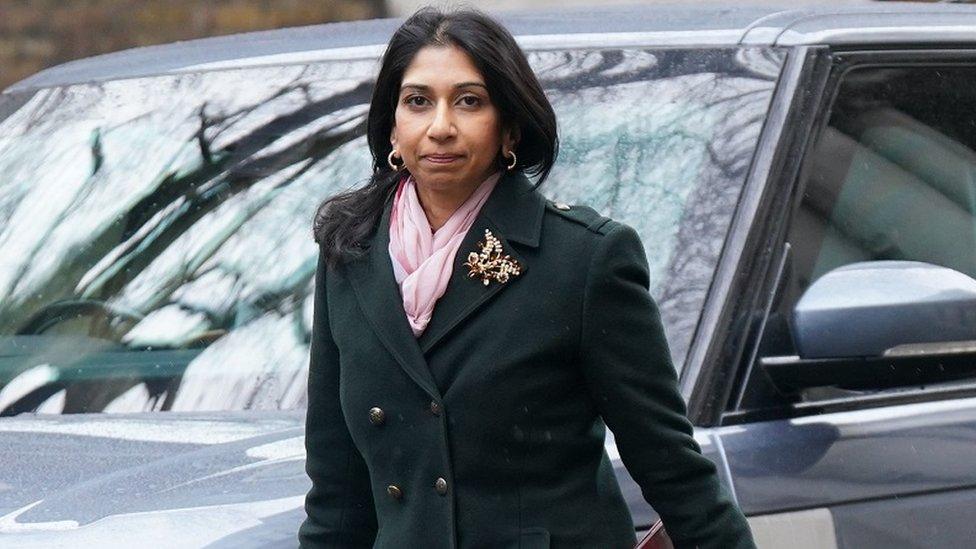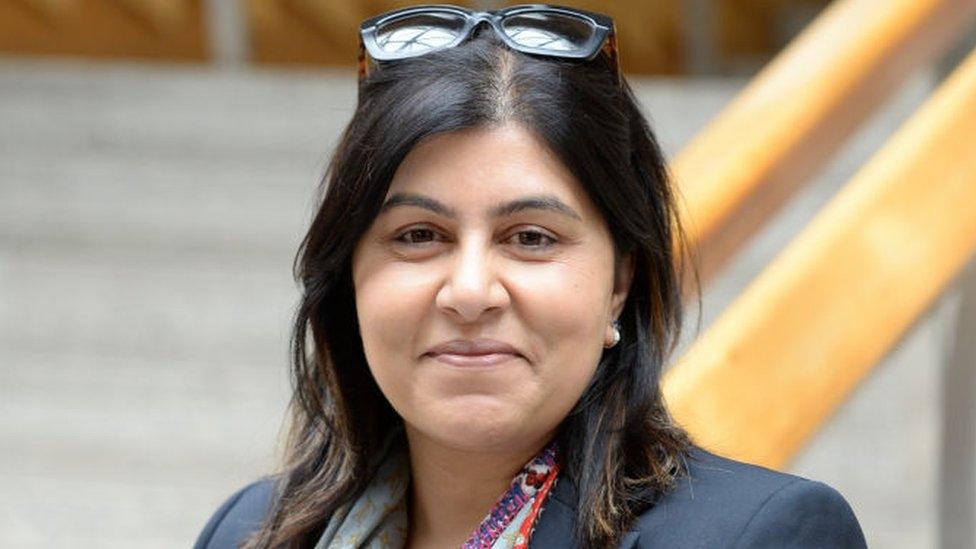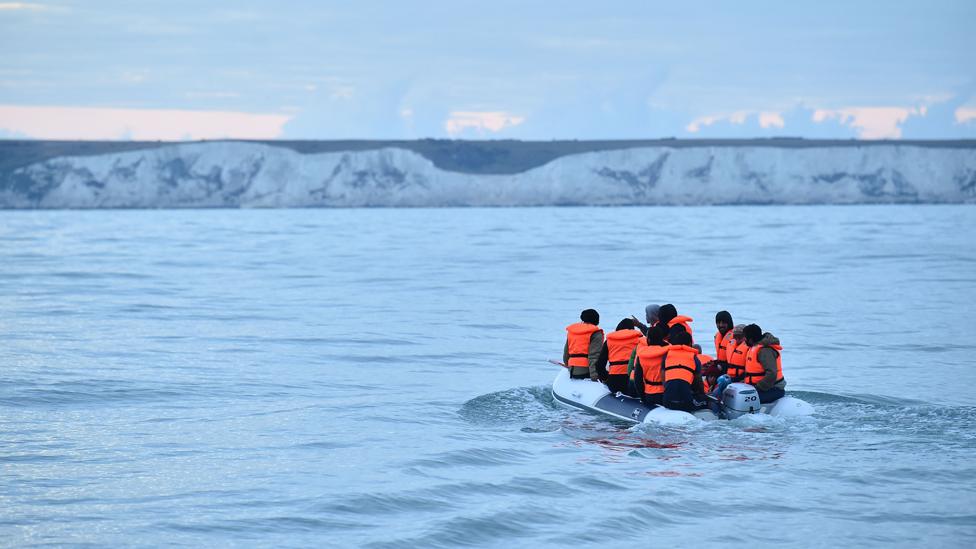Suella Braverman rhetoric fuels racism, claims Tory peer
- Published

Suella Braverman has launched a taskforce to tackle grooming gangs
Tory peer Baroness Warsi has warned that what she describes as Suella Braverman's "racist rhetoric" is putting British Asian families at risk.
The peer, the UK's first South Asian cabinet minister, claimed the home secretary's comments on small boats and grooming gangs "emboldened racists".
She told the BBC she feared a backlash against British Asians and had told her dad not to walk home from the mosque.
Ms Braverman's spokesperson said she would "not shy away from hard truths".
Ahead of announcing plans for a new police taskforce to tackle grooming gangs, Ms Braverman said groups of "vulnerable white English girls" were being "pursued and raped and drugged and harmed by gangs of British Pakistani men who've worked in child abuse networks".
'Inflammatory and divisive'
Prime Minister Rishi Sunak - who jointly launched the taskforce with Ms Braverman - said victims and whistleblowers had often been ignored by the authorities because of "cultural sensitivity and political correctness".
In an interview on Sky TV's Sophy Ridge on Sunday, the home secretary said grooming gangs had a "predominance" of "British Pakistani males, who hold cultural values totally at odds with British values".
Ms Braverman said police and council workers had "turned a blind eye to these signs of abuse out of political correctness and out of fear of being called racist" - referencing findings in several reports into grooming in Rochdale, Rotherham and Telford.
In a series of joint letters to the prime minister, a coalition of groups including senior medics , externaland the British Pakistan Foundation called on Ms Braverman to withdraw her comments, which some labelled as "inflammatory and divisive".
Baroness Warsi, who chaired the Conservative Party between 2010 and 2012, backed the letters, adding that the home secretary's comments had left vulnerable British Asians fearful of attacks.
"I've had to warn my son that if people start swearing and shouting, to just remove himself from the situation to avoid it escalating into an attack. Why should I be having these conversations with my son?," she told BBC News.
"I've had to tell my dad if you go to the mosque don't walk home, we need to have someone taking him and bringing him back every day."

Sayeeda Warsi was a Conservative Party chairwoman between 2010 and 2012
She said Ms Braverman "was tarnishing a whole community" by focusing on British Pakistanis, who were a "small subset" of perpetrators in a context of half a million children a year being sexually abused.
"If you look at the interviews she did, she gave no caveats," Baroness Warsi added.
"Ms Braverman basically said group sexual exploitation is a British Pakistani problem. At no point in those interviews did she say it was a small minority of British Pakistanis committing these crimes."
A 2020 Home Office study found, external offenders in child grooming gangs "are most commonly white", based on data from just under half of all police forces.
'Shock jock'
The same report found "a number" of high-profile cases had "mainly involved men of Pakistani ethnicity", but also highlighted "significant limitations to what can be said about links between ethnicity and this form of offending".
In 2012, while serving in David Cameron's cabinet, Baroness Warsi said a "small minority" of British Pakistani men believe "white girls are fair game" for sexual abuse.
Her comments followed revelations that a child grooming gang of mostly Pakistani men preyed on girls under the age of 16 in Rochdale.
Referencing her former comments, Baroness Warsi said: "I am the last person to say don't have bold and brave conservations with local communities - but they need to be based in fact.
"Suella Braverman needs to understand that when she opens her mouth she's speaking as a home secretary. She can't use loose language.
"This kind of 'shock jock' language is becoming a pattern with her. It feels like she more interested in the rhetoric and the noise of creating a culture war than the actual job."
Writing in the Guardian,, external Baroness Warsi added: "Whether this consistent use of racist rhetoric is strategy or incompetence, however, doesn't matter. Both show she is not fit to hold high office."
A Home Office spokesperson said: "The Home Secretary has been clear that all despicable child abusers must be brought to justice.
"And she will not shy away from telling hard truths, particularly when it comes to the grooming of young women and girls in Britain's towns who have been failed by authorities over decades.
"As the Home Secretary has said, the vast majority of British-Pakistanis are law-abiding, upstanding citizens but independent reports were unequivocal that in towns like Rochdale, Rotherham and Telford cultural sensitivities have meant thousands of young girls were abused under the noses of councils and police.
"That's why we have announced a raft of measures, including a new police taskforce and mandatory reporting, to ensure this horrific scandal can never happen again, and bring members of grooming gangs to justice for the victims."
Ms Braverman's comments were supported in a joint statement from UK Sikh and Hindu faith groups. The letter, external praised Ms Braverman, for "courageously speaking out about the over representation of British Pakistani men in sex grooming gangs".
The letter, signed by crossbench peer Lord Singh of Wimbledon, said it was "false to label all Pakistani Muslim men as groomers" but politicians should not "allow political correctness to stifle obtaining justice for victims by addressing the actions of a minority".
Small boat numbers
Baroness Warsi also criticised Ms Braverman's claims that "100 million people" around the world could qualify for protection under current UK asylum laws - and that "they are coming here".
This refers to people forcibly displaced around the world as recorded by the UN's refugee agency, external. There is nothing to suggest they would all want to come to the UK.
The Home Office said Ms Braverman meant that illegal migrants were coming to the UK - pointing out that there had been a 500% increase in small boat crossings in two years.
Small boat arrivals accounted for about 45% of asylum applications made in 2022.
Related topics
- Published4 April 2023

